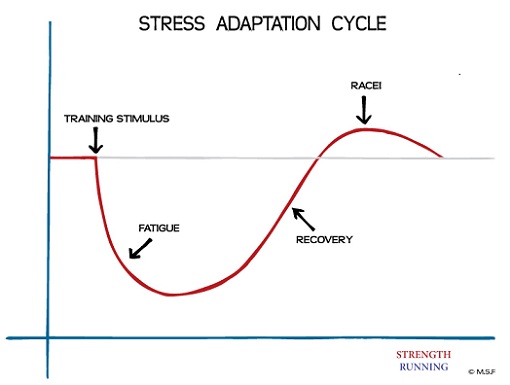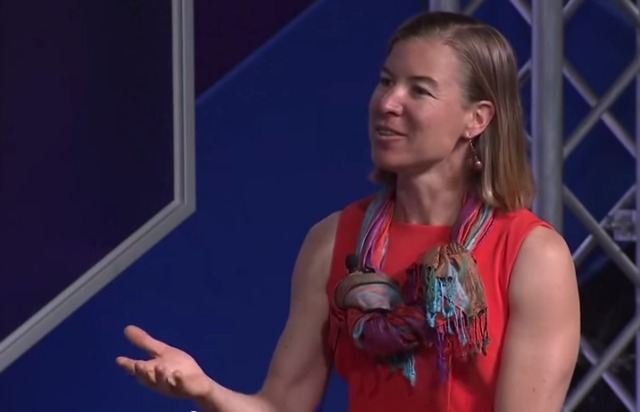Today, every runner is looking for an edge that will help them improve. And no area is more robust for improvement than your post workout recovery.

How should your post workout recovery be structured?
Recovery is the opposite side of the fitness coin: there’s training and there’s recovery.
Runners typically spend all of their time focusing on our training. I’m guilty of over-focusing on training as well – just look at some of my recent articles:
- Bodyweight Strength Training
- Qualify for the Boston Marathon
- How to Improve Athleticism
- Combat the Effects of Aging
But recovery is necessary to benefit from training. As our guest on the podcast, Ms. Christie Aschwanden, recently told me:
You can only benefit from training that you recover from.
That’s because the recovery process includes adaptation. If your body had its own voice, it might say Wow, that 15-mile run was hard on me. I’m going to build more mitochondria in my muscle cells and better conserve fuel. That way, if this crazy person goes on another 15-miler, it won’t be so hard!
Your body is lazy. It doesn’t want to do hard things so it adapts and gets stronger, more economical, and more resilient so the next time you attempt a challenging run, you’re better prepared.
This is the Stress-Adaptation Process at work:

We cover “training stimuli” all the time here on Strength Running. Today, let’s focus on recovery.
Post Workout Recovery 101
Recovery means much more than what you do – it’s also about what you don’t do.
For example, many runners think foam rolling or taking an ice bath are effective recovery methods. And if you enjoy them, I won’t argue! But what you’re not doing is equally important:
- Are you using your day off from running to do your own taxes and run 34 errands?
- Did you plan your big (i.e., stressful) family vacation for your post-marathon recovery week?
- Do you stay out late enjoying one or several too many adult beverages?
If the answer is yes, then it almost doesn’t matter what you do for your post workout recovery.
Because the addition of stress – whether physical or mental – derails our best recovery efforts. That’s why when I was in college, our track coach was very understanding of poor workout splits during mid-terms. You simply can’t perform physically and mentally at a high level for very long.
We previously discussed a hierarchy of injury prevention strategies and how some tactics are far more effective than others. The same is true for recovery strategies.
I want you to understand the best, most productive, and effective ways to recover from your hardest workouts.
And I’m thrilled to present you with today’s podcast episode.
Christie Aschwanden on Recovery

Christie is the lead science writer for FiveThirtyEight and a former health columnist for the Washington Post. She’s also a finalist for the National Magazine Award and her work has been featured in Discover, Smithsonian, and O, The Oprah Magazine.
A fellow Coloradan like myself, Christie was a high school state champion in the 1,6000m run, a national collegiate cycling champion, and an elite cross-country skier with Team Rossignol.
Her new book is Good to Go: What The Athlete in All of Us Can Learn From the Strange Science of Recovery.
She’s on the podcast to discuss individual post workout recovery strategies but also the bigger questions:
- How do we know if we’re fooling ourselves that something is working (when it isn’t)?
- Why isn’t it enough to simply ask, “Does this recovery method work?”
- Overall, have we made recovery too complicated?
- How do you prioritize mental recovery?
- If you were to speak to the entire Olympic Team about recovery, what would you say?
This episode is an excerpt of my full conversation with Christie for the Team Strength Running group coaching program.
Subscribe to the Strength Running Podcast on Apple Music, Stitcher, or wherever you prefer to listen to podcasts.
Resources & Links From the Show:
- Christie’s book
- Her website
- Follow Christie on Twitter
- 9 Pro Runners on Recovery
- How to Sleep Better, Faster, Longer
- Team Strength Running
- Over-Training Syndrome Q&A
I hope this conversation was helpful as you plan your upcoming running season. After all, there can be no progress without recovery so it’s a critical topic!
To hear more on recovery, we reached out to nine elite athletes to hear their favorite recovery advice. These are the runners who are running triple digit mileage and blazing fast workouts. They ask the most from their bodies and need optimized post workout recovery.
Everything is included in The Little Black Book of Recovery & Prevention – yours free as compliments for being a Strength Running reader.